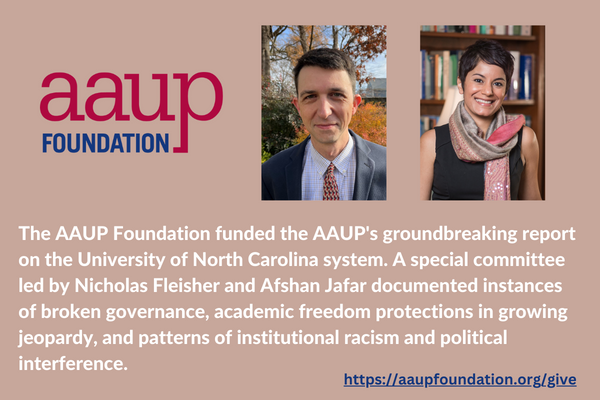Dear Colleague,
I'm grateful for the generosity of all who have contributed already to the year-end campaign for the AAUP Foundation, the charitable and educational arm of the AAUP and the primary funder of some of its signature work to protect academic freedom and higher education in a free and democratic society. Special recognition goes to our dedicated supporters who contribute every year—or every month through recurring donations—and to those who have given this year at the Advocate, Beacon, and Luminary levels (starting, respectively, at $500, $1,000, and $5,000). We will acknowledge all donors who do not request anonymity in our annual Honor Roll of Donors.
If you have not yet had a chance to give, I urge you to make a tax-deductible donation to the AAUP Foundation before the new year.
The Foundation’s Academic Freedom Fund provided major funding for this year’s truly groundbreaking special report Governance, Academic Freedom, and Institutional Racism in the University of North Carolina System. This AAUP report detailed how political pressure from the gerrymandered North Carolina legislature influenced the systemwide board of governors and the campus boards of trustees—jeopardizing academic freedom, eroding meaningful faculty participation in governance, and reinforcing the persistent institutional racism that makes campuses unwelcoming to faculty, staff, and students of color. A joint resolution from our Committee on Historically Black Institutions and Scholars of Color, Committee on College and University Governance, and Committee A on Academic Freedom and Tenure to “resoundingly condemn the University of North Carolina System board of governors and system office” was passed unanimously by our governing Council in June. The resolution, made possible by the AAUP Foundation-funded special report, represents a meaningful step forward in acknowledging and beginning to address systemic and institutional racism in the academy. Our work in this direction continues.

Legislation to limit or prohibit teaching about slavery, the legacy of racism in the United States, and other topics deemed to be “divisive” continues to be proposed at an alarming rate. These educational gag orders have no place in higher education. They are a disservice to our students, who are denied the opportunity to learn and grow, and lead to a very dangerous demonization of educators and education.
To advance understanding among educators and the broader public of the critical importance of academic freedom, the AAUP Foundation underwrites our Journal of Academic Freedom. The most recent volume responds thoughtfully and comprehensively to the onslaught of political interference with a rich collection of articles, which the editors describe as offering “a chilling panorama of the ongoing struggle between legitimate scholarship and nostalgic propaganda—between informed discourse seeking to enlighten and expand knowledge about past and present and dogmatic censorship.”
Your contribution will help us to fight back against outside interference in teaching and research.
The Foundation’s Academic Freedom Fund supports conferences and professional development on principles of academic freedom and shared governance. Through the Foundation, we offer financial assistance to individual faculty members whose academic freedom has been violated. In 2023, a new grant will continue our support for the vitally important Faculty First Responders project, which Trinity College political scientist Isaac Kamola developed to comprehensively monitor partisan news coverage designed to stir up outrage resulting in brutal online harassment of faculty members, most often related to work on race or gender studies. The project trains faculty members to respond quickly and effectively when they or their colleagues are targeted.
The Foundation’s Legal Defense Fund supports litigation that safeguards academic freedom and professional rights, and it provides funding for the amicus briefs we file in cases with important implications for higher education. This year, the Foundation’s support allowed the AAUP to weigh in on cases to support affirmative action admissions policies at Harvard University and the University of North Carolina at Chapel Hill, to advocate for the collective bargaining rights of faculty and staff at Bates College, and to challenge the federal government’s discriminatory targeting and surveillance of Asian American and Asian immigrant scientists and researchers.
I am so proud of the work we were able to do this year with the support of the AAUP Foundation. I look forward to continuing and expanding that work moving forward. Your donation in any amount will help.
Please join me in supporting the AAUP Foundation!
Sincerely,
Irene Mulvey
President, AAUP and AAUP Foundation
P.S. If you prefer to donate by mail, please make a check payable to "AAUP Foundation" and send to:
AAUP Foundation
555 New Jersey Avenue NW, Suite 600
Washington DC 20001